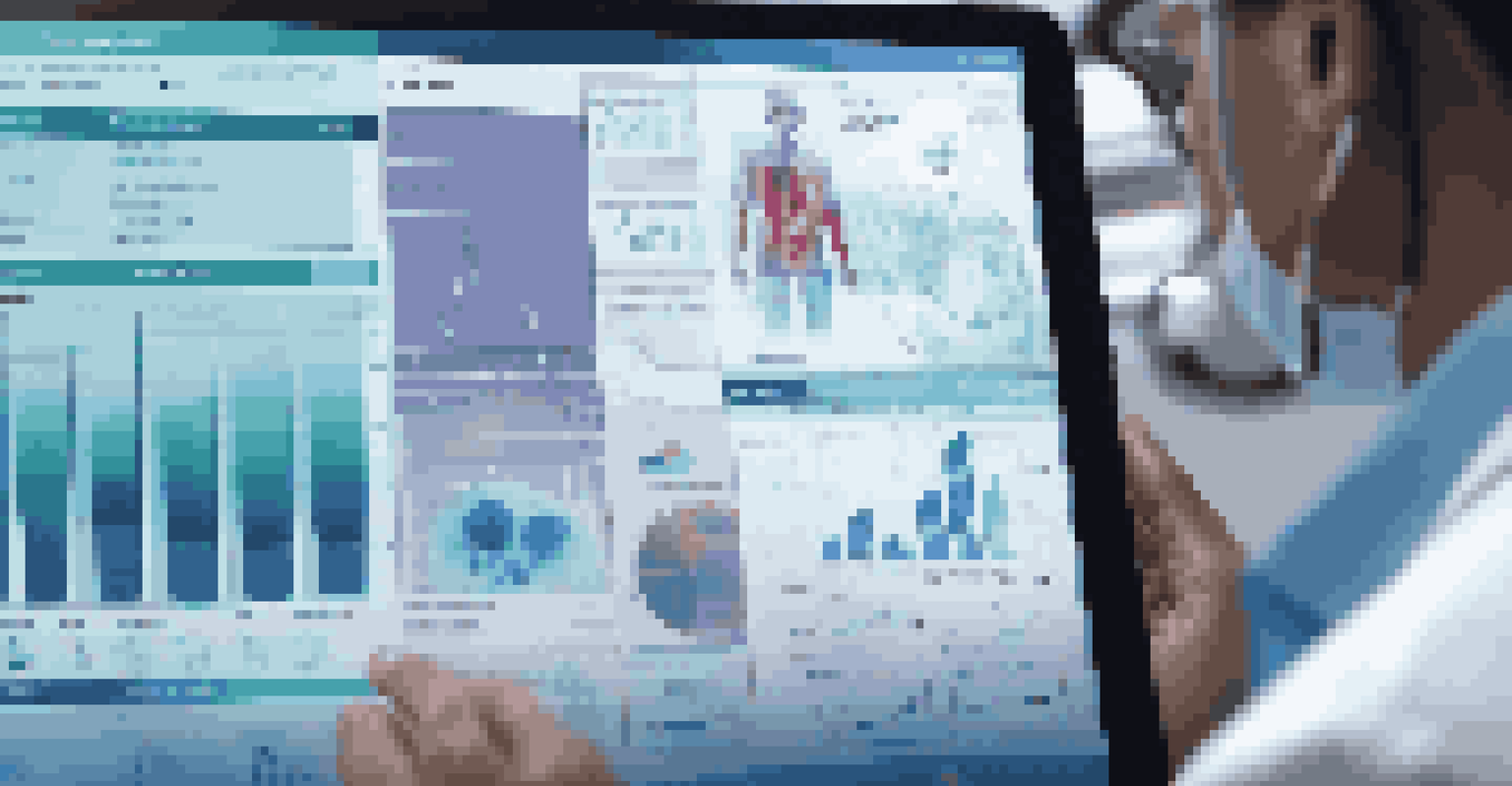AI and Cloud Computing: Enhancing Healthcare Data Management

The Intersection of AI and Cloud Computing in Healthcare
Artificial Intelligence (AI) and cloud computing are revolutionizing the healthcare landscape. By combining these technologies, healthcare providers can enhance their ability to manage vast amounts of data. This intersection allows for more efficient data processing and storage, resulting in improved patient care.
The future of medicine will be based on artificial intelligence, data science, and cloud computing.
For instance, cloud computing provides the infrastructure necessary to store and analyze patient records securely. AI algorithms can sift through this data, identifying patterns and insights that would be impossible for humans to detect alone. Together, they create a powerful synergy that boosts operational efficiency.
The ongoing advancements in AI and cloud technologies ensure that healthcare professionals have access to the most relevant information at their fingertips. This not only improves decision-making but also enhances patient outcomes, making healthcare more responsive and personalized.
Enhancing Data Security with AI and Cloud Solutions
Data security is a top concern in the healthcare sector, where sensitive patient information is constantly at risk. Fortunately, AI and cloud computing offer innovative solutions for safeguarding this data. With robust encryption methods and continuous monitoring, healthcare providers can better protect against cyber threats.

AI plays a significant role in detecting unusual patterns or anomalies in data access, which could indicate a security breach. By analyzing real-time data, AI systems can alert administrators to potential risks before they escalate. This proactive approach is crucial in maintaining patient trust and compliance with regulations.
AI and Cloud Enhance Patient Care
The combination of AI and cloud computing enables healthcare providers to efficiently manage data, leading to improved patient outcomes and personalized treatment.
Moreover, cloud technology provides a scalable and flexible solution for data storage, ensuring that sensitive information is not only secure but easily accessible to authorized personnel. This balance of security and accessibility is vital for effective healthcare data management.
Streamlining Patient Care Through Data Integration
One of the significant advantages of AI and cloud computing is their ability to integrate diverse data sources. Patient data often resides in various systems, making it challenging for healthcare providers to gain a holistic view of an individual's health. By utilizing cloud platforms, this data can be consolidated into a single accessible location.
Data is the new oil, and its value is multiplied when combined with AI and cloud technology.
AI algorithms can analyze this integrated data, helping to identify trends and correlations that enhance patient care. For example, predictive analytics can forecast potential health issues based on historical data, allowing healthcare professionals to intervene before problems arise. This proactive approach leads to better health outcomes.
As a result, healthcare providers can offer more personalized treatment plans, tailored to the unique needs of each patient. This integration not only improves the quality of care but also fosters a more collaborative environment among healthcare teams.
AI-Driven Decision Support Systems in Healthcare
Decision support systems powered by AI are becoming essential tools for healthcare professionals. These systems analyze large datasets to provide actionable insights that assist in clinical decision-making. By leveraging AI, healthcare providers can make more informed choices that enhance patient care.
For instance, AI can analyze patient symptoms and suggest possible diagnoses, helping doctors consider options they might not have thought of. This is particularly beneficial in complex cases where time is of the essence. The result is a more efficient and effective diagnostic process.
Data Security Innovations in Healthcare
AI and cloud solutions bolster data security in healthcare by detecting anomalies and ensuring sensitive patient information is both secure and accessible.
Moreover, these systems can learn from past cases, continuously improving their recommendations over time. This iterative learning process ensures that healthcare professionals have access to the most current and relevant information, ultimately leading to better patient outcomes.
Improving Operational Efficiency with Cloud-Based Solutions
Operational efficiency is crucial for healthcare organizations aiming to provide quality care while managing costs. Cloud-based solutions streamline various administrative tasks, such as billing, scheduling, and patient record management. This allows healthcare staff to focus more on patient care rather than paperwork.
By automating routine tasks through cloud technology, healthcare providers can reduce errors and improve workflow efficiency. For example, cloud-based scheduling tools can optimize appointment bookings, minimizing wait times for patients. This not only enhances the patient experience but also improves overall operational performance.
Additionally, cloud solutions offer real-time access to data, enabling healthcare teams to collaborate more effectively. This increased accessibility fosters better communication among staff, leading to more coordinated care and improved patient outcomes.
The Role of AI in Predictive Analytics for Health Outcomes
Predictive analytics is a game changer in healthcare, allowing providers to anticipate patient needs and outcomes. AI algorithms analyze historical data to identify trends that can inform future healthcare decisions. This capability is especially valuable in managing chronic diseases and improving overall public health.
For instance, by analyzing data from patients with similar conditions, AI can predict which patients are at higher risk for complications. This enables healthcare providers to implement preventive measures tailored to those individuals, potentially avoiding serious health crises. The proactive approach shifts the focus from reactive care to preventive healthcare.
Predictive Analytics for Better Health
Predictive analytics powered by AI allows healthcare providers to anticipate patient needs, enabling proactive interventions that enhance overall health outcomes.
As predictive analytics continues to evolve, its integration with cloud computing ensures that healthcare providers have the most comprehensive insights available. This combination empowers healthcare teams to make data-driven decisions that enhance patient care and improve health outcomes.
Challenges and Future of AI and Cloud in Healthcare
Despite the numerous advantages of AI and cloud computing in healthcare, challenges remain. Issues such as data privacy concerns, regulatory compliance, and the need for interoperability between different systems can hinder progress. Addressing these challenges is essential for maximizing the benefits of these technologies.
Moreover, as healthcare organizations adopt AI and cloud solutions, there is a learning curve involved. Staff training and adaptation to new systems are critical for successful implementation. This requires investment in both time and resources to ensure that the technology is utilized effectively.

Looking ahead, the future of AI and cloud computing in healthcare appears promising. With ongoing advancements and a growing understanding of these technologies, the potential to improve patient care, data management, and overall health outcomes will continue to expand. The key will be navigating the challenges while embracing the transformative power of innovation.